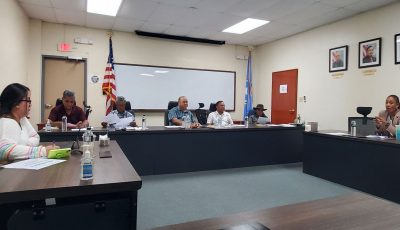‘COVID-19 forced IPI to terminate lease, affected operations’
As part of cost-cutting measures due to COVID-19’s impact, Imperial Pacific International (CNMI) LLC has been forced to notify its landlord at IPI’s central office that it must terminate its lease effective last April 1, according to IPI in-house legal counsel Kelley Marie Butcher.
Butcher said the central office is the place where the discovery materials in connection with the lawsuit by seven former workers against IPI have been stored and were being processed.
She did not specify the location of IPI’s central office.
Butcher’s declaration was filed before the U.S. District Court for the NMI Monday last week, in support of IPI’s opposition to seven former workers’ motion for sanctions against IPI. She executed the declaration in San Diego, California last March 29.
The former workers who are suing IPI and its contractor and subcontractor have asked the federal court to sanction IPI for allegedly violating the court’s order. The seven plaintiffs, through counsel Aaron Halegua and Bruce Berline, said IPI has violated the court’s initial order to produce all discovery materials by Jan. 13, 2020.
Halegua and Berline said IPI has now also violated the stipulation ordered by the court requiring it to produce all discovery materials by Feb. 24, 2020.
In her declaration, Butcher revealed that almost all of the IPI central office employees have either been laid off, moved to half-time work, moved to an on-call basis, or been moved to at-home work only. She said that, of the 10 IPI employees assigned to work with her on this discovery project, four have been laid off and five are now working part-time.
IPI hired Shawn Davis, formerly of the Law Offices of Matthew Smith, to assist Butcher as an independent contractor to assist with IPI’s compliance with its discovery obligations for this case. Butcher said Davis now works on an on-call basis, but due to the COVID-19 shelter-in-place requirement, is not currently working.
Finally, Butcher said, this is only the beginning of the COVID-19 situation and it is quite likely that working conditions at IPI, and the rest of the CNMI (and the USA and the world) will only get worse in the coming months.
Butcher said plaintiffs with their motion are pushing for the court to impose a deadline which IPI must produce all responsive discovery. “While I recognize that IPI must produce all responsive non-privileged discovery records reasonably promptly, I also know the severe effects that the COVID-19 situation is having on IPI and other business operations, and IPI’s ability to produce responsive discovery on a predictable schedule,” she said.
Butcher said the casino has been shut down and employees riffed or laid off.
Butcher said IPI is a company that is only a few years old, with virtually no experience with the significant issues involved with electronic discovery. Butcher said she herself has no prior experience with large-scale electronic discovery projects. She said there has never been a case litigated in the CNMI that involves anywhere near the scale, scope, and significant issues involved with the e-discovery aspects of this case.
The lawyer said three current IPI legal department employees and three IPI Information Technology employees were assigned part-time under her direction. She said four additional IPI employees were assigned to the legal department. Butcher said these additional employees were specifically assigned on matters related to this case and IPI’s discovery obligations.
Butcher said she and IPI identified and contracted with Litigation Edge, an e-discovery vendor with a primary office in Ohio with an Asian client servicing office with Chinese language capabilities in Singapore, to assist them with complying with IPI’s e-discovery obligations for this case.
Butcher said she, however, realized that the significant steps involved with gathering responsive discovery—this unique issue they faced regarding the manner in which data was stored, the high amount of employee turnover, that IPI was deprived of access to much of the responsive data and other materials because of the raids conducted by the U.S. government in November 2019, the sheer amount and varied types of data involved, and the many deadlines imposed by that order—were impossible for IPI to comply with.
She pointed out that while IPI has missed some discovery deadlines, it’s doing so was not due to willfulness, bad faith, or the fault of IPI.
Butcher said IPI has already hired Sean Frink, who is experienced in defending institutional clients in civil litigation in the CNMI, and probably the only attorney in the CNMI with significant experience in large project e-discovery, and Catherine Cachero, to represent IPI in this matter starting last March 2.
She said Cachero and Frink have made significant progress since they came aboard in identifying the best path forward for IPI to meet its discovery obligations and in meeting those obligations.
Butcher said from Dec. 13, 2019, until March 2, 2020, she was the only attorney representing IPI in this case. Butcher said she was unexpectedly required to return to San Antonio, Texas last March 20 to further assist her mother, who has serious health complications. Because of COVID-19 travel restriction concerns, Butcher said she left Saipan early last March 17 to get to the mainland. She said she is currently in San Diego getting her son established after the U.S. Air Force Academy, where he is a cadet, sent most cadets home due to COVID-19 concerns.
Butcher was set to leave San Diego last March 30 for San Antonio, Texas, where she expects to remain with her mother there until at least April 20, 2020.




























